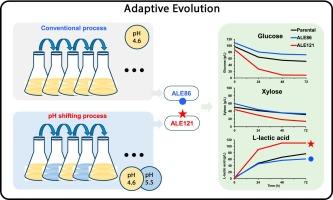pH偏移适应性进化激发了Pediococcus acidilactici的低pH耐受性和高L-乳酸发酵效率。
IF 9.7
1区 环境科学与生态学
Q1 AGRICULTURAL ENGINEERING
引用次数: 0
摘要
在低 pH 值条件下发酵 L-乳酸可减少发酵过程中中和剂的使用以及净化过程中固体废物的产生。大多数乳酸菌对低 pH 值的耐受性较弱,细胞活力较差。本研究提出了一种 pH 值转换适应性进化方法,以提高工程化 Pediococcus acidilactici 菌株对低 pH 值的耐受性。第一阶段,在中等 pH 值条件下培养细胞,以保持细胞活力,然后转移到低 pH 值条件下,以提高对低 pH 值的耐受性。当使用小麦秸秆作为原料时,在pH值为4.6(110.4克/升)和pH值为4.4(80.7克/升)的条件下,工程P. acidilactici菌株的L-乳酸产量分别比亲本菌株增加了43%和2.1倍(80.7克/升)。这种改变 pH 值的适应性进化策略为提高乳酸菌对低 pH 值的耐受性提供了有效工具。本文章由计算机程序翻译,如有差异,请以英文原文为准。

pH shifting adaptive evolution stimulates the low pH tolerance of Pediococcus acidilactici and high L-lactic acid fermentation efficiency
L-lactic acid fermentation at low pH reduces the use of neutralizers during fermentation and the generation of solid wastes in purification processes. Most lactic acid bacteria exhibit weak tolerance and poor cell viability at low pH. This study proposes a pH shifting adaptive evolution method to improve the low-pH tolerance of an engineered Pediococcus acidilactici strain. In the first stage, cells were cultured at a moderate pH to maintain the cell viability, then shifted to a low pH to enhance low-pH tolerance. Long-term pH shifting evolution culture of the engineered P. acidilactici between the moderate and low pH resulted in a 43 % increase in L-lactic acid production at pH 4.6 (110.4 g/L) and a 2.1-fold increase at pH 4.4 (80.7 g/L) compared to the parental strain when using wheat straw as a feedstock. This pH-shifting adaptive evolution strategy provides an effective tool for improving the low-pH tolerance of lactic acid bacteria.
求助全文
通过发布文献求助,成功后即可免费获取论文全文。
去求助
来源期刊

Bioresource Technology
工程技术-能源与燃料
CiteScore
20.80
自引率
19.30%
发文量
2013
审稿时长
12 days
期刊介绍:
Bioresource Technology publishes original articles, review articles, case studies, and short communications covering the fundamentals, applications, and management of bioresource technology. The journal seeks to advance and disseminate knowledge across various areas related to biomass, biological waste treatment, bioenergy, biotransformations, bioresource systems analysis, and associated conversion or production technologies.
Topics include:
• Biofuels: liquid and gaseous biofuels production, modeling and economics
• Bioprocesses and bioproducts: biocatalysis and fermentations
• Biomass and feedstocks utilization: bioconversion of agro-industrial residues
• Environmental protection: biological waste treatment
• Thermochemical conversion of biomass: combustion, pyrolysis, gasification, catalysis.
 求助内容:
求助内容: 应助结果提醒方式:
应助结果提醒方式:


